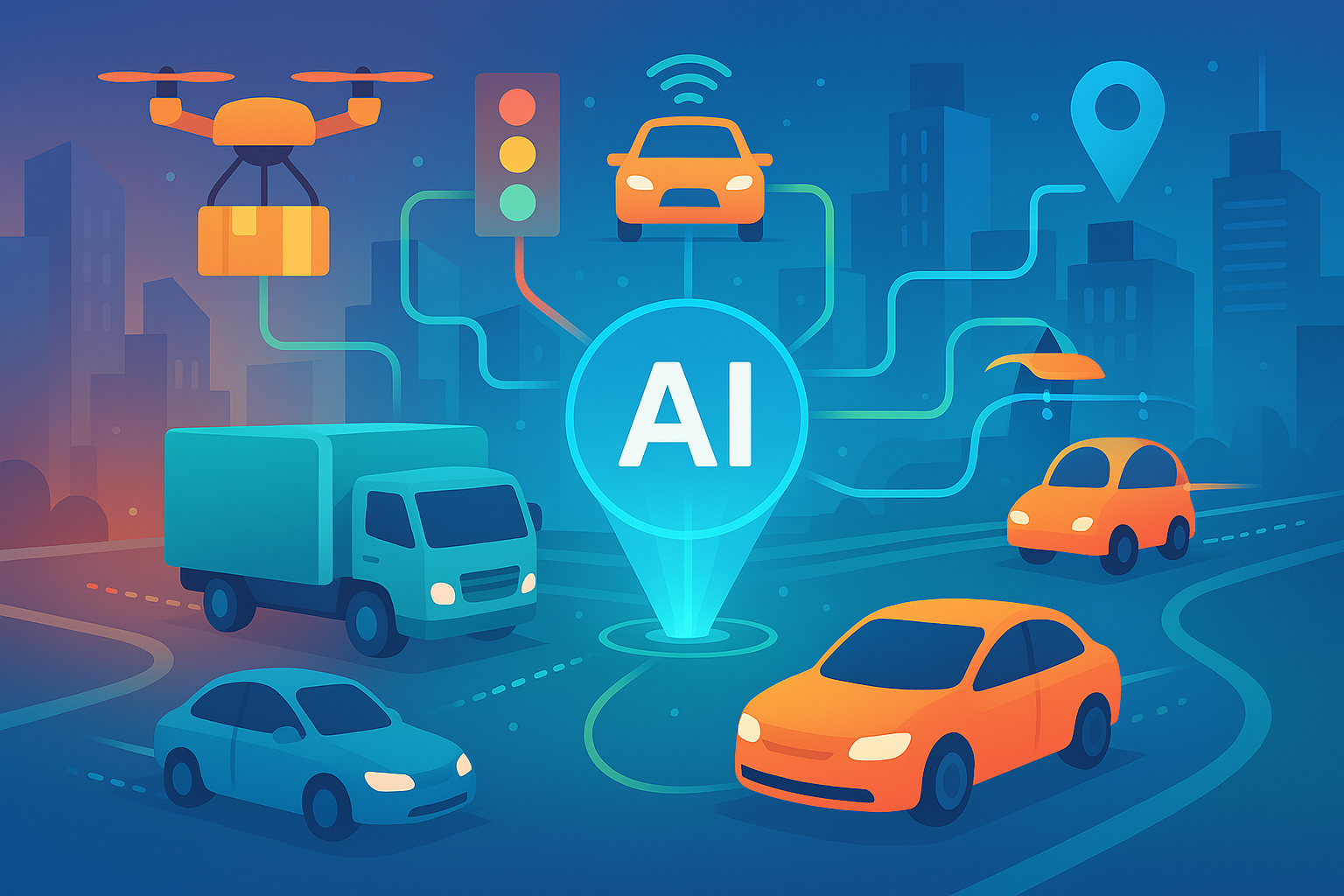
Introduction: Navigating the Future with Intelligent Systems
The transportation and logistics industries are undergoing a profound transformation driven by the rapid advancements in Artificial Intelligence (AI). In 2025, AI-powered platforms like FleetFlow AI are optimizing every aspect of how goods and people move, leading to unprecedented levels of efficiency, safety, and sustainability.
From autonomous vehicles navigating complex urban environments to intelligent systems streamlining global supply chains, AI is poised to redefine the very fabric of transportation and logistics.
What is AI in Transportation and Logistics?
AI in transportation and logistics involves the application of machine learning, computer vision, natural language processing, and other AI techniques to optimize various aspects of these industries. This includes:
-
Autonomous Vehicles (AVs): Self-driving cars, trucks, and drones that use AI to perceive their environment and navigate without human intervention.
-
Smart Traffic Management: AI systems that analyze traffic patterns, optimize signal timings, and predict congestion.
-
Predictive Maintenance: AI algorithms that analyze sensor data from vehicles and infrastructure to predict and prevent failures.
-
Route Optimization and Planning: AI-powered software that calculates the most efficient routes for delivery vehicles and passenger transport.
-
Warehouse Automation: AI-driven robots and systems that automate tasks such as sorting, packing, and inventory management.
-
Supply Chain Optimization: AI tools that analyze vast amounts of data to forecast demand, manage inventory, and optimize logistics networks.
-
Fleet Management: AI platforms that provide real-time tracking, performance analysis, and predictive insights for vehicle fleets.
FleetFlow AI integrates these AI capabilities into a comprehensive platform designed to enhance the efficiency, safety, and sustainability of transportation and logistics operations.
Why AI Matters for Transportation and Logistics in 2025
The integration of AI into transportation and logistics offers significant advantages in addressing the evolving challenges of mobility and supply chain management:
✅ Increased Efficiency: Optimizing routes, reducing delays, and automating processes to improve speed and throughput.
✅ Enhanced Safety: Reducing human error, enabling collision avoidance in autonomous vehicles, and predicting maintenance needs.
✅ Reduced Costs: Optimizing fuel consumption, minimizing downtime, and automating labor-intensive tasks.
✅ Improved Sustainability: Optimizing routes to reduce emissions and enabling the adoption of electric and autonomous vehicles.
✅ Enhanced Visibility: Providing real-time tracking and insights across the entire supply chain.
✅ Improved Customer Experience: Enabling faster deliveries, more accurate ETAs, and personalized transportation options.
Real-World Use Cases
The impact of AI is already being felt across various sectors of transportation and logistics:
-
Ride-sharing companies are deploying AI for route optimization, dynamic pricing, and enhanced safety features.
-
E-commerce giants are utilizing AI-powered robots in their warehouses and exploring drone delivery for last-mile logistics.
-
Trucking companies are testing autonomous trucks for long-haul transportation to improve efficiency and driver safety.
-
Ports and shipping companies are leveraging AI for container tracking, predictive maintenance of equipment, and optimized loading/unloading processes.
-
Public transportation agencies are implementing smart traffic management systems and exploring autonomous buses and trains.
-
Airlines are using AI for predictive maintenance of aircraft, optimized flight scheduling, and improved passenger flow at airports.
The FleetFlow AI Advantage
FleetFlow AI offers a suite of intelligent solutions designed for the future of transportation and logistics, including:
-
🚗 Autonomous Vehicle Control and Management
-
🚦 Smart Traffic Optimization Algorithms
-
⚙️ Predictive Maintenance for Vehicles and Infrastructure
-
🗺️ Intelligent Route Planning and Optimization
-
📦 AI-Powered Warehouse Automation Tools
-
🔗 End-to-End Supply Chain Visibility and Optimization
-
📊 Real-time Fleet Tracking and Performance Analytics
FleetFlow AI is built on a foundation of robust data security, scalability, and seamless integration with existing transportation and logistics infrastructure.
What Does the Future Look Like?
The future of transportation and logistics will be characterized by even greater autonomy, connectivity, and intelligence. We anticipate:
-
Widespread adoption of autonomous vehicles for both passenger and freight transport.
-
Interconnected smart cities with optimized traffic flow managed by AI systems.
-
Fully automated warehouses and logistics hubs powered by AI and robotics.
-
Predictive and adaptive supply chains that can anticipate and respond to disruptions in real-time.
-
The emergence of new mobility-as-a-service (MaaS) models enabled by AI and autonomous vehicles.
-
A greater emphasis on sustainability, with AI playing a key role in optimizing energy consumption and reducing emissions in transportation.
The future of how we move people and goods is intelligent, efficient, and increasingly autonomous, driven by the transformative power of AI.
Final Thoughts
The integration of AI into transportation and logistics, spearheaded by platforms like FleetFlow AI, is not just an incremental improvement but a fundamental shift that will reshape these industries in 2025 and beyond. By embracing AI-powered solutions, businesses and governments can unlock unprecedented levels of efficiency, safety, and sustainability, paving the way for a smarter and more connected future of mobility and commerce.
It’s time to navigate the future of movement. Let FleetFlow AI be your guide to the intelligent revolution in transportation and logistics.